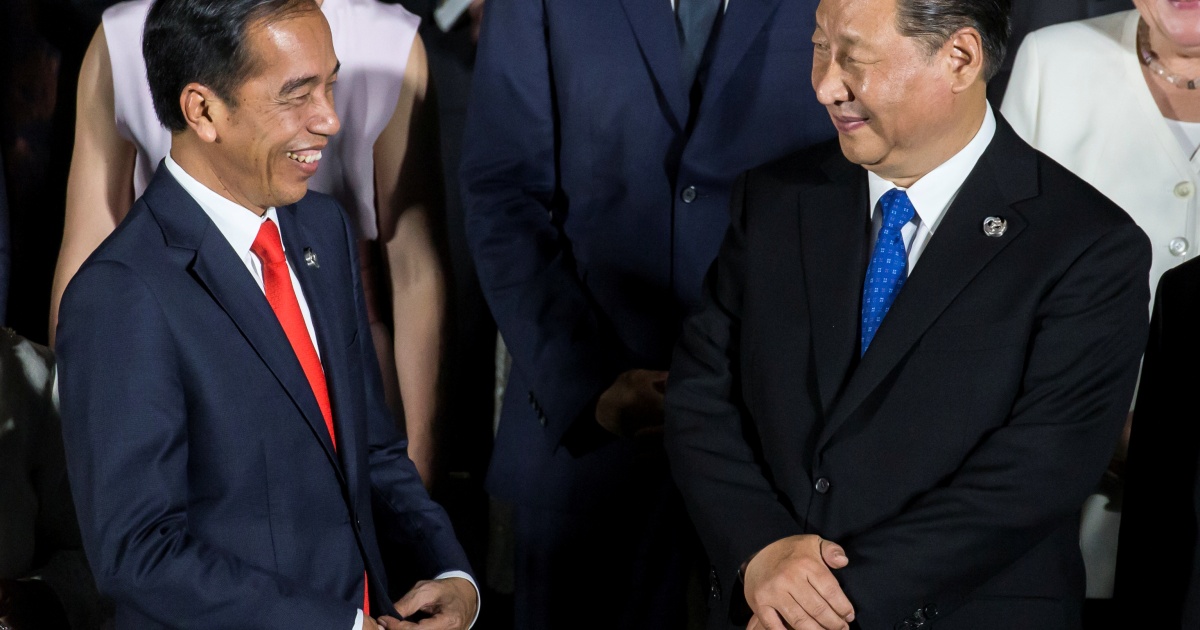‘Golden opportunity’: Widodo’s China trip puts spotlight on trade
Indonesian leader’s visit is first trip by a foreign leader to China since the Winter Olympics in February.
Medan, Indonesia – When Indonesian President Joko “Jokowi” Widodo meets Chinese President Xi Jinping in Beijing on the first leg of a three-country tour of Asia, trade and investment will be at the top of the agenda.
Widodo’s visit on Monday is the first trip by a foreign leader to China since the Winter Olympic Games in February due to Beijing’s adoption of an ultra-strict “zero Covid” policy that has limited visits by foreign dignitaries.
Widodo is due to meet Xi on Tuesday, before departing for Japan and South Korea for talks with their respective leaders later in the week.
Speaking to the media on Thursday ahead of the trip, Indonesian Foreign Minister Retno Marsudi said Widodo’s talks with Xi would focus on trade and investment.
China is Indonesia’s largest trading partner, with two-way trade and inward investment reaching $110bn and $3.2bn, respectively, last year.
Trissia Wijaya, a Center for Indonesian Policy Studies researcher, said Widodo’s visit will be mutually beneficial.
“It seems that Xi Jinping is making good use of this opportunity to spotlight Beijing’s position that it is gradually ready to open its doors for foreign dignitaries and give a hard signal that Beijing has been closely observing regional development despite its ‘zero Covid’ policy,” Wijaya told Al Jazeera.
“This is also a golden opportunity for Indonesia to discuss various economic issues, especially in the investment aspect involving China.”
Wijaya said the issues could include a long-delayed high-speed rail project involving Indonesian and Chinese state-owned enterprises.
Indonesia’s first high-speed railway, which has been under construction for the last six years, will connect Jakarta and the city of Bandung using China’s CR400AF “Fuxing” bullet trains, which are the fastest in the world.
“On the Chinese side, there is still no clarity about what has caused this project to continue to be delayed,” Wijaya said. “This fast train will be Jokowi’s legacy, and of course Jokowi wants this project to be operational at least before 2024.”
Analysts have also pointed to the timing of Widodo’s visit ahead of the G20 Summit to be held in Bali in November.
Indonesia currently holds the annual presidency of the economic forum made up of 19 countries and the European Union, and Jokowi has undertaken several other trips to G20 countries recently, including Russia, where he spoke with President Vladimir Putin about the ongoing war with Ukraine and restarting food and produce exports from the two countries.
“Most likely this trip is related to the G20 event and Chinese investment in the future,” Siwage Dharma Negara, a senior fellow at the Iseas Yusof Ishak Institute, told Al Jazeera.
“The challenge will be when will the pandemic be over? The ‘zero Covid’ policy in China will affect investment in Indonesia and other countries, and Jokowi will be seeking support from G20 countries to attend the November summit in Bali.”
On Thursday, Marsudi, the Indonesian foreign minister, said that Indonesia appreciated the strong support of all G20 member countries, including China, Japan and Korea.
“In the midst of a world situation filled with unhealthy rivalries and the diminishing value of multilateralism, Indonesia will actually be more active in establishing the spirit of cooperation, solidarity and peace,” she said.
Chinese Foreign Ministry Spokesperson Wang Wenbin told a press briefing on Thursday that the talks will also focus on “an in-depth exchange of views focusing on bilateral relations and major regional and international issues”.
Over the years, China-Indonesia relations have at times been tense.
“Indonesia’s main concern with regards to security matters with China is over sovereignty,” research analyst Uday Bakhshi told Al Jazeera.
“Indonesia and China do not have a formal dispute in the South China Sea. However, parts of Indonesia’s Exclusive Economic Zone (EEZ) are claimed by China under its Nine Dash Line. This has been one of the main sources of diplomatic tensions between the two countries.”
Chinese coast guard vessels have entered Indonesia’s EEZ and come within 12 nautical miles (22km) of Indonesia on multiple occasions over the last decade. Authorities have also recovered suspected Chinese surveillance drones in waters off South Sulawesi, the Riau Islands, and East Java since 2019.
“Indonesia is very nationalistic, but officials have often tried to downplay these incidents. This is mainly due to the economic relationship between the two countries,” Bakhshi said.
Yohanes Sulaiman, a lecturer in international relations at Universitas Jenderal Achmad Yani in Bandung, said the relationship between the two countries “remains tenuous”.
“On one hand, Indonesia needs China due to China’s huge economy, as a source of investment and trade,” Sulaiman told Al Jazeera.
“On the other hand, Indonesia remains wary of China as a source of troubles, notably security problems. In the last ten years, after China’s growing belligerence in the South China Sea, its favorability in Indonesia has decreased.”
Trust in China has declined amongst Indonesians, according to a 2021 survey by the Lowy Institute, an Australian think tank.
When asked which country is the most important for Indonesia’s economy, 18 percent of respondents chose the United States and 12 percent said China, while 30 percent were in favour of Chinese investment, compared with 42 percent in favour of US investment.
While a 2011 poll by the institute found that a majority of Indonesians believed China would be Asia’s leading economic power, just 31 percent now feel that way.
Sulaiman said that perceptions had not been helped by some of the unflattering media coverage that has followed Chinese economic interests in Indonesia.
“China’s investments in Indonesia have been plagued by news about Chinese labourers coming to Indonesia to replace local workers and bypassing the country’s quarantine during COVID,” he said.













